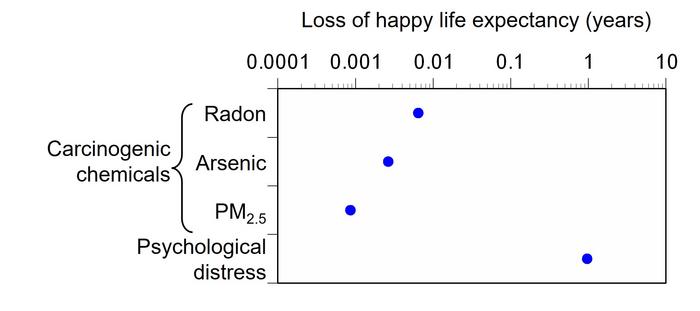Osaka, Japan – If improving your outlook on life really was as simple as “don’t worry, be happy,” then keeping your spirits up would be a piece of cake. Unfortunately, it’s not so simple, as a multitude of factors beyond our control can affect our mood.

Credit: Michio Murakami, Kyoko Ono, Yoshitake Takebayashi, Masaharu Tsubokura, Shuhei Nomura, Comparing the risks of environmental carcinogenic chemicals in Japan using the loss of happy life expectancy indicator, Environmental Research, 251(1), 118637, 2024. doi: 10.1016/j.envres.2024.118637.
Osaka, Japan – If improving your outlook on life really was as simple as “don’t worry, be happy,” then keeping your spirits up would be a piece of cake. Unfortunately, it’s not so simple, as a multitude of factors beyond our control can affect our mood.
In a study published in March in Environmental Research, researchers from Osaka University have revealed that contaminants in the environment can have an effect on our lifespan emotional wellbeing.
A recently developed risk assessment tool defined happy life expectancy as the lifespan during which a person experiences subjective emotional wellbeing, while loss of happy life expectancy (LHpLE) was defined as a decrease in the length of positive emotional experiences in an individual’s life. LHpLE is calculated by combining both the reduction in happiness and the increase in mortality associated with risk exposure.
“We previously used the LHpLE indicator to evaluate psychological distress and cancer risk associated with radiation exposure after the Fukushima Daiichi Nuclear Power Station accident, among other situations,” says lead author of the study Michio Murakami. “However, this tool has not been used to assess the effects of cancer or exposure to environmental carcinogens on happiness.”
To address this, the researchers surveyed Japanese people to determine their average happiness by age and sex, and evaluate whether cancer reduces emotional happiness. Then, LHpLE was calculated for exposure to common environmental cancer-causing agents in Japan, as well as psychological distress, allowing comparison of the different types of risk exposure.
“The results were intriguing,” explains Shuhei Nomura, young author. “We found that emotional happiness did not decrease significantly in those with cancer, nor was there any significant association between emotional happiness and cancer type, history, or stage.”
Overall, exposure to environmental carcinogens decreased the lifespan emotional happiness by 0.0064 years for radon, 0.0026 years for arsenic, and 0.00086 years for fine particulate matter in the air, owing to their mortality. The decrease in emotional happiness was even more pronounced for psychological distress, which resulted in an LHpLE of 0.97 years.
“Our findings suggest that exposure to carcinogens and psychological distress significantly decrease lifetime happiness,” says Murakami.
Given the clear decrease in lifespan emotional happiness associated with carcinogens, the findings from this study suggest that environmental policies should focus on reducing exposure to these chemicals. Applying this understanding to public health policies could help people live longer, happier lives.
###
The article, “Comparing the risks of environmental carcinogenic chemicals in Japan using the loss of happy life expectancy indicator,” was published in Environmental Research at DOI: https://doi.org/10.1016/j.envres.2024.118637
About Osaka University
Osaka University was founded in 1931 as one of the seven imperial universities of Japan and is now one of Japan’s leading comprehensive universities with a broad disciplinary spectrum. This strength is coupled with a singular drive for innovation that extends throughout the scientific process, from fundamental research to the creation of applied technology with positive economic impacts. Its commitment to innovation has been recognized in Japan and around the world, being named Japan’s most innovative university in 2015 (Reuters 2015 Top 100) and one of the most innovative institutions in the world in 2017 (Innovative Universities and the Nature Index Innovation 2017). Now, Osaka University is leveraging its role as a Designated National University Corporation selected by the Ministry of Education, Culture, Sports, Science and Technology to contribute to innovation for human welfare, sustainable development of society, and social transformation.
Website: https://resou.osaka-u.ac.jp/en
Journal
Environmental Research
DOI
10.1016/j.envres.2024.118637
Method of Research
Observational study
Subject of Research
People
Article Title
Comparing the risks of environmental carcinogenic chemicals in Japan using the loss of happy life expectancy indicator
Article Publication Date
8-Mar-2024




